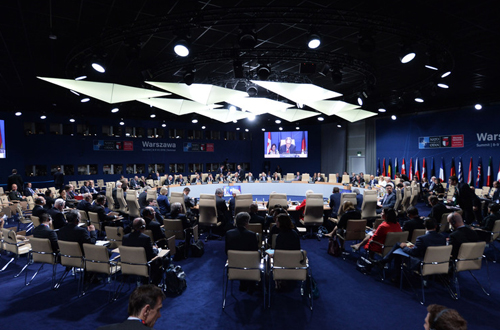NATO, Georgia Agree on ‘New Steps to Intensify’ Cooperation
- NATO to support in air defence and air surveillance;
- ‘New initiatives to strengthen Georgia’s defence capabilities’;
- NATO to ‘deepen its focus on security in the Black Sea region’;
- NATO hails Georgia’s ‘steady progress to stronger democracy’;
- NATO calls on Georgia to ‘sustain momentum in reforms’;
- North Atlantic Council to visit Georgia this autumn;

NATO-Georgia Commission meeting at the level of foreign ministers at the NATO Summit in Warsaw, July 8, 2016. Photo: NATO
NATO and Georgia have agreed on “new steps” to strengthen country’s defense capabilities, among them in air defence and surveillance, foreign ministers of the Alliance said after meeting with Georgian counterpart at the NATO Warsaw summit on July 8.
In a joint statement after a meeting at the level of foreign ministers, the NATO-Georgia Commission said that “new initiatives” also include increased support for Georgia’s training and education and strategic communications.
The NATO foreign ministers “welcomed Georgia’s engagement in strategic discussion on Black Sea security” and also said that the Alliance will deepen its focus on security in the Black Sea region.
Noting “significant progress” in implementing the Substantial NATO-Georgia Package, endorsed by the Alliance at the Wales summit in 2014, the NATO-Georgia Commission’s joint statement then lists measures undertaken in this regard over the past two years.
Those steps include launch of the Joint Training and Evaluation Center (JTEC) in Georgia – Allied Command Transformation has been tasked to affiliate the center with NATO’s training and exercise work; presence of more than 30 Allied and partner security experts in Georgia to support the country in security reform efforts, including in areas such as cyber defence, aviation and logistics; the inauguration of the Defence Institution Building School in Georgia, which will provide a first pilot course this month; holding of NATO-Georgia exercise, open to partners, with the next joint drills planned in November.
“We have also decided on new steps to intensify our cooperation, to help strengthen Georgia’s defence capabilities, interoperability and resilience capabilities. These initiatives include increased support for Georgia’s Training and Education, including through a possible trust fund project, and Strategic Communications. Allies will provide support to the development of Georgia’s air defence and air surveillance,” reads the NATO-Georgia Commission statement.
“Both the existing and new initiatives aim to strengthen Georgia’s defence and interoperability capabilities with the Alliance and are helping Georgia, an aspirant country, progress in its preparations towards membership,” it said.
Georgia’s Defense Minister, Tina Khidasheli, said that decisions made at the NATO Warsaw summit will help Georgia’s self-defense capabilities, including through “integrating” Georgia’s air defense system to the one of the Alliance.
“As you are aware we have an agreement with the French side based on which we have started development of this area of our Armed Forces, but we have been asking NATO for additional capabilities and, even more important, is integration into NATO’s system and that’s what we received here today. That implies that from the very day – January, 2017 – when we start implementation of active phase of the French agreement, our air defense systems will be fully integrated with NATO’s air defense system,” said Khidasheli, who met her French counterpart Jean-Yves Le Drian in Paris last month.
She was referring to contract Georgia signed last year with ThalesRaytheonSystems, which produces ground-based surveillance radars and air defense command and control systems, as well as with missile manufacturer MBDA France.
- Georgia in NATO Warsaw Summit Communiqué
- Defense Minister Speaks of NATO’s Decisions on Georgia at Warsaw Summit
Like in December 2015, NATO foreign ministers again reiterated that Georgia’s relationship with the Alliance “contains all the practical tools to prepare for eventual membership”, but also reaffirmed that before joining the Alliance the country should go through a Membership Action Plan (MAP) phase, which Georgia has been denied since 2008.
Granting MAP to Georgia at the Warsaw summit was not expected.
The foreign minister also reiterated 2008 NATO Bucharest summit decision that Georgia will join the Alliance.
‘Steady Progress towards Stronger Democracy’
NATO foreign ministers “commended the steady progress made by Georgia towards stronger democracy, economic development and more effective defence institutions and modernised armed forces.”
They also “encouraged Georgia to sustain the momentum in its overall reforms, which NATO will continue to support.”
“NATO ministers looked forward to the October 2016 Parliamentary elections being conducted in accordance with the highest democratic standards,” reads the statement.
It also says that ambassadors from NATO member-states from the Alliance’s political decision-making body, North Atlantic Council (NAC), will visit Georgia this autumn.
It will be NAC’s fourth visit to Georgia; the first one took place in September, 2008, when NATO-Georgia Commission was launched, and then in November, 2011 and June, 2013.
The Alliance reiterated that it highly appreciates Georgia’s “significant contribution” to the NATO-led operations in Afghanistan and said that this, as well as Georgia’s contribution to the EU-led operations, demonstrates country’s “commitment and capability to contribute to Euro-Atlantic security.”
With 861 soldiers Georgia is the third largest troop contributor to NATO’s Resolute Support mission in Afghanistan after the United States (7,000 troops) and Germany (980 troops).
The NATO foreign ministers also reiterated their “full support to the territorial integrity and sovereignty of Georgia” and called on Russia to reciprocate Tbilisi’s unilateral non-use of force pledge.
NATO also reiterated its call on Russia to “reverse its recognition of the South Ossetia and Abkhazia regions of Georgia as independent states and to withdraw its forces from Georgia.”
We are here among friends strategizing how to make #World, #BlackSea and #Georgia a safer place @NATOsummits pic.twitter.com/5r2u8JZFWI
— President Of Georgia (@MargvelashviliG) July 8, 2016
The Georgian delegation at the Warsaw summit is led by President Giorgi Margvelashvili, who met NATO Secretary General Jens Stoltenberg on July 8.
This post is also available in: ქართული (Georgian) Русский (Russian)